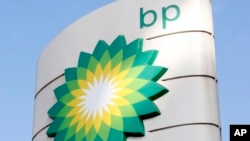A growing number of Western businesses are either halting operations in Russia or exiting altogether over that country’s military incursion of neighboring Ukraine.
The major hit to Russia’s economy will likely come from the crucial oil and gas industry. Chief Executive Officer Ben van Beurden of Britain-based Shell Oil Company issued an apology Tuesday for buying Russian crude oil last week, and said the company would end all of its operations in Russia, including pipeline gas and liquid natural gas.
Shell previously announced it was abandoning its joint venture with state-owned Gazprom and the now-suspended Nord Stream 2 pipeline, built to carry natural gas from Russia to western Europe. British-based BP also announced early last week that it is divesting its $14 billion stake in Russian state-owned oil and gas company Rosneft.
Japanese automakers Toyota and Nissan have announced plans to suspend production at their plants in the western port city of St. Petersburg and end all vehicle exports to Russia. A third Japanese automaker, Honda, has also halted all exports to Russia, including motorcycles and engines.
Another major manufacturing firm cutting ties with Russia is U.S.-based aviation giant Boeing, which has suspended buying titanium for use in building airplanes.
On Tuesday, fast food restaurant McDonald’s announced it would temporarily close its 850 stores in Russia, adding it would continue to pay its 62,000 employees there.
Also on Tuesday, the New York Times announced it was pulling its journalists out of Russia in response to a new law that makes publishing what the government deems as “fake news” punishable with prison sentences.
The BBC, Bloomberg and other media outlets pulled staff last week.
In the clothing sector, legendary U.S.-blue jeans maker Levi Strauss announced Monday that it is suspending sales of its products and ending any new investments in Russia, saying that any business considerations “are clearly secondary to the human suffering experienced by so many.” Levi Strauss said it would donate $300,000 to support humanitarian efforts in Ukraine launched by the International Rescue Committee and CARE.
Financial services companies are also cutting ties. Credit card companies Visa and Mastercard, along with payments company PayPal, all announced last week they were suspending operations in Russia, with high end rival American Express announcing on March 1 that it is halting relationships with Russian banking partners. U.S.-based Vanguard, the world’s top mutual fund investment firm, says it has ended purchases of Russian securities from its actively managed funds and is working to exit its holdings across all its index funds.
Tech and entertainment companies are also turning their backs on Russia over Ukraine. U.S.-based streaming video service Netflix has suspended all services in Russia and is ending all future projects and acquisitions there, while Hollywood giants Warner Brothers, Disney and Sony Pictures are all delaying the release of new films in Russia.
Apple has blocked Russia-based RT News and Sputnik News from its app store outside of Russia, while Google and TikTok have blocked Russian state media channels from their platforms.
Meanwhile, Apple has stopped selling iPhones and other devices in Russia, while U.S.-based computer maker Dell Technologies has suspended sales of its products in both Russia and Ukraine.
Some information for this report came from The Associated Press and Reuters.
Editor's note: “A previous version of this article misstated the date on which BP announced its divestiture from Rosneft.”





